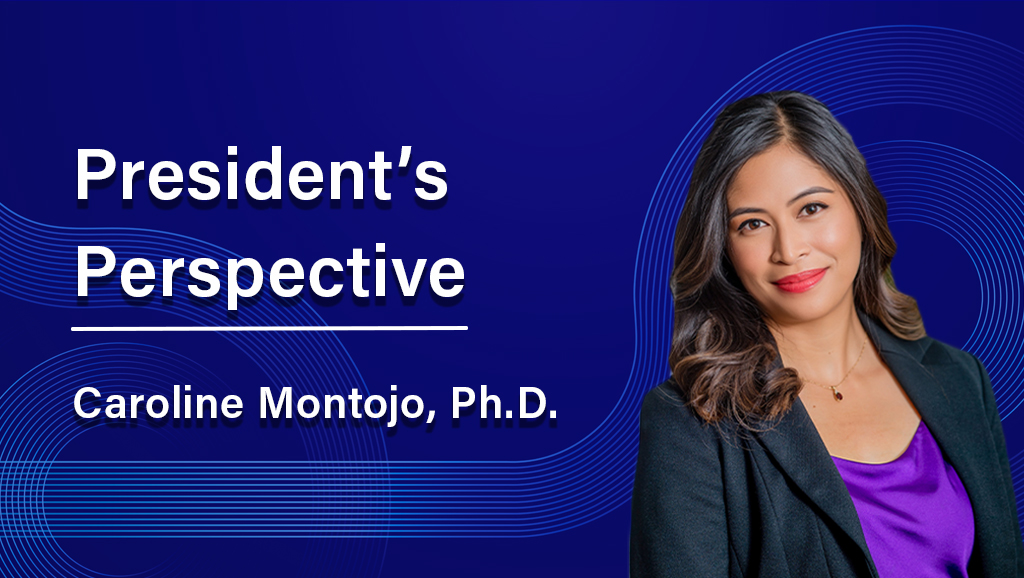Impact Story
Worldwide Impact: IBRO Extends the Reach of Brain Awareness Week
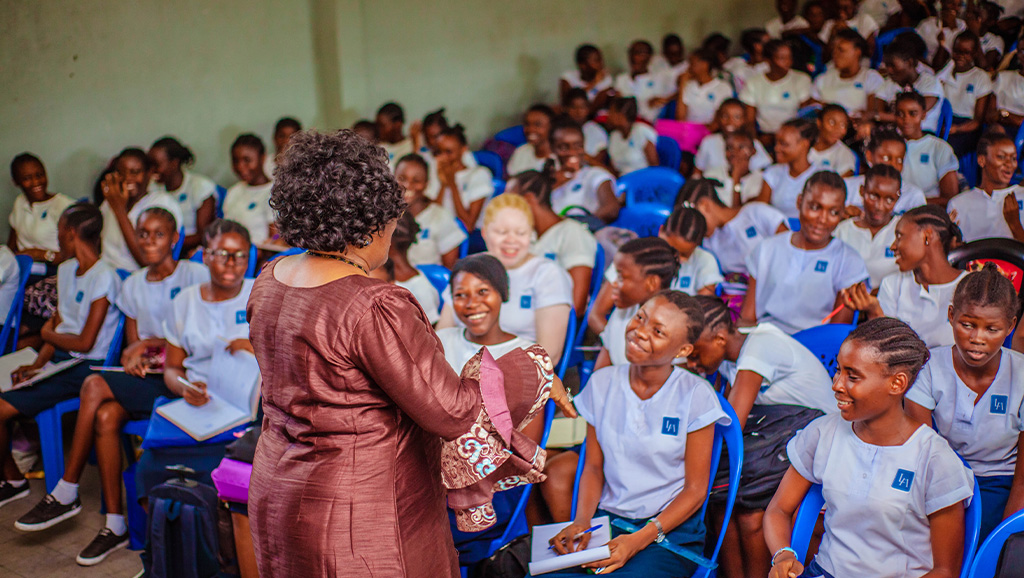
For nearly three decades, Brain Awareness Week has fostered public enthusiasm and support for brain science through a range of local outreach programs, targeting people of every age and background. Each of the events an organizer holds furthers the campaign’s mission: to share the wonders of the brain and the impact brain science has on our everyday lives.
Because Brain Awareness Week organizers are part of the communities they target in their outreach, they know what topics local people might want, or need, and what types of activities will draw them in. Organizers host brain fairs; musical performances; classroom programs; art contests; lab tours; library visits; lively debates; quiet spaces to share feelings about a disease or diagnosis; even podcasts and television appearances.
It’s a big community. During the 2023 campaign, hundreds of events were held in more than 50 countries across six continents. Event organizers include colleges and universities, hospitals, medical research facilities, K-12 schools, advocacy groups, outreach organizations, professional associations, government agencies, and more. Many have organized Brain Awareness Week events for years.
Global Outreach
To extend the campaign’s reach and touch the lives of more people, the Dana Foundation funds large annual grants to two neuroscience associations that then offer smaller grants to individual groups. One of the two Dana Foundation grantees, the International Brain Research Organization (IBRO), is an association of more than 90 international, regional, and national neuroscience societies globally. Through its Brain Awareness Week grants program, IBRO offers general support for outreach activities, with an emphasis on regions challenged by lack of resources, support, and/or public understanding about the brain.
In the past three years, IBRO’s Brain Awareness Week grants have supported 116 outreach events in 38 countries (Asia Pacific: 13; Africa: 15; Latin America: 8; North America: 2).
“IBRO aims to bring neuroscience to the world, with a particular focus on levelling the playing field in terms of neuroscience opportunities around the world,”, said Rebecca Hadid, Ph.D., IBRO’s director of grants and programs. Through grants from other sources, the association supports professional career development and events targeted to academic and scientific communities. “The Brain Awareness Week grants program is unique by targeting regionally specific community needs.”
Identifying Community Needs
Each year, organizations apply to IBRO, describing their Brain Awareness Week plans. The applications are separated by geography and sent for review to their respective regional committees, who are in the best position to understand the particular needs of the area, Hadid said. The chairperson of each regional committee then consults with the reviewers and others to choose the successful proposals.
In Mongolia, a 2021 grant helped planners promote and stage a brain art competition, formal lectures, and informal public events, said Battuvshin Lkhagvasuren, M.D., Ph.D., director of the Brain Science Institute at the Mongolian National University of Medical Sciences in Ulaanbaatar.
“These events were the first of their kind in Mongolia,” he said. “They helped reduce stigma about neuroscience and mental health, and they gave people an outlet to share their thoughts and ideas.” In addition, Brain Awareness Week and other IBRO-supported events “have helped to create a community of people who are committed to promoting brain science” in the country, said Lkhagvasuren.
In Cameroon, a 2022 grant helped bring scientists and medical staff to various local schools, reaching more than 5,000 students, said Mundih Noelar Njohjam, M.D., founder of the Epilepsy Awareness and Aid Foundation, based in Bamenda.
“It was really interesting to watch [the students] as we explained the wonderful nature of the brain and how neurological diseases occur,” she said, “especially epilepsy, because in our country epilepsy is often attributed to witchcraft.”
“After listening to us talk, one student openly told us that before we came, he was one of those who usually stigmatized people with epilepsy,” she said. “So many of them confessed after the presentation that their mindset about epilepsy has really changed.”
Since attending the presentations and participating in other activities, dozens of students have joined her foundation to become peer educators. “They want to educate others that epilepsy is a brain condition, and it’s not caused by witchcraft,” said Njohjam.
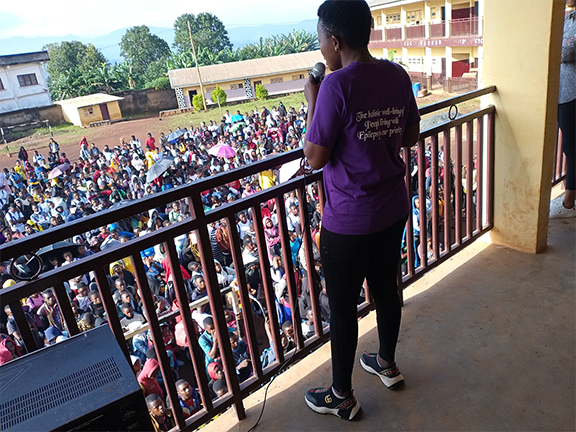

Born and raised in Cameroon, Mundih earned her MD degree at the University of Yaoundé with first-class honors in 2019. Photo courtesy of GivingTuesday Africa.
Beyond Local Impact
Connecting with local communities is a main goal for Brain Awareness Week programs, but affiliated or standalone events that target policymakers or the media can amplify an organizer’s message and extend the impact of their work.
In addition to their school programs and community events, the Mongolian National University of Medical Sciences has hosted events for both policymakers and the media: an annual meeting for invited policymakers, and a 2022 press conference. (Read more about Brain Science Week 2022 in Mongolia.) These events have been received enthusiastically by their intended audiences.
The policymaker discussions help the university get support from the decision-makers, said Lkhagvasuren. Since they began hosting these events, the Mongolian government has started to show more support for neuroscience, funding more research projects and developing human resources, he explained.
Journalists from more than 20 media outlets attended their 2022 press conference, and it later resulted in 17 interviews and columns in newspapers, broadcast television, and media websites—including all the major media networks in the country. This coverage helped to broaden the impact of their Brain Awareness Week events by reaching an even larger and more diverse audience with information about the brain, and also helped to build the university’s reputation nationally, positioning the university and its staff as expert resources for the media.
Gaining Visibility
Being identified as a grantee from IBRO can boost an organization’s reputation, said Cameroon’s Njohjam. When people search your name and see that you’re a grant recipient, it adds a certain level of prestige,” she said. “It really helped us and added more credibility to the activities that we were doing.”
“Sometimes people think that because it’s a small grant, it might not be enough, and they should focus on bigger grants,” said Njohjam. “But I think—1,200 dollars—it makes a great difference. We could pay for t-shirts, educational fliers, and publicity. We would have still organized the event, but these pieces helped us reach an even wider audience.”
Reputation and community also stood out as benefits to Diego Golombek, Ph.D., from Universidad de San Andrés and National Research Council in Argentina. In 2023, the university held two sets of activities: One, taking place at the University of San Andres campus in Buenos Aires, engaged around 400 high school students from seven public and private schools. The other, a Neurofair at the Science Cultural Center of the Ministry of Science, drew around 700 people. “We were able to gather an interesting group of volunteers, mostly enthusiastic undergraduate students who took the task very seriously,” he said.
When the activities concluded, Golombek and his team ran a brief oral survey with the high school students. “They claimed they not only learned a lot about neuroscience, but some of them would consider it as a possible career path,” he said.
“Having IBRO as part of the event helped us to gain more public visibility. Getting the grant is actually being part of the International Brain Awareness Week community.”
Building on Success
The Dana Foundation was a founding partner of the IBRO Global Engagement Initiative, which aimed to increase awareness and build support for brain research, informed policymaking, training, and education through activities and events that are culturally sensitive and regionally relevant. Support for IBRO’s Brain Awareness Week grants continues this legacy of outreach support and addresses an important need for funding at the community level.
“The number of applications received for Brain Awareness Week grants has continued to grow annually since the launch of the program in 2020, despite two years of lockdowns and global disruption caused by the Covid-19 pandemic,” said Hadid. The number of applications has more than doubled, with an increasing number of organizations—including IBRO member societies—inspired to apply. “In the last call for applications alone, 254 applications were received, indicating an ever-increasing demand for funding worldwide,” she added.
In response to this demand, the Dana Foundation increased its funding to IBRO by 60 percent for 2024 events. This funding will support approximately 96 projects.
“Increasing the number of individuals brought together through diverse Brain Awareness Week programming further advances our shared mission to allow for informed decision-making regarding brain health, as well as to inspire the next generation of neuroscientists,” said IBRO’s Hadid. “We are very much looking forward to seeing the next cohort of funded projects.”
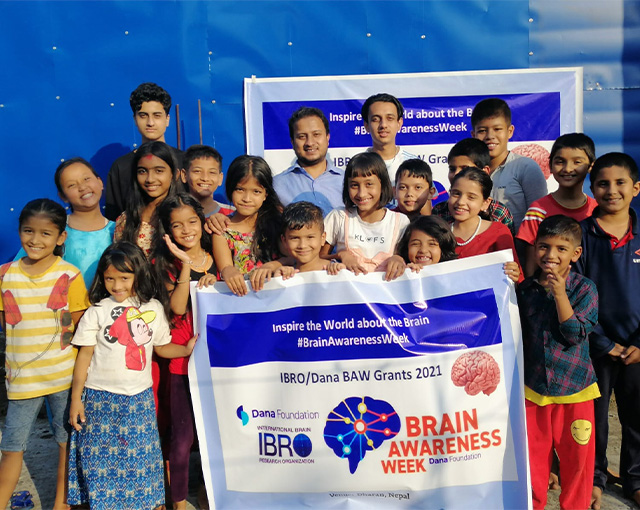

Group photo at a past Brain Awareness Week event in Nepal. Photo courtesy of IBRO.
Recommended Reading
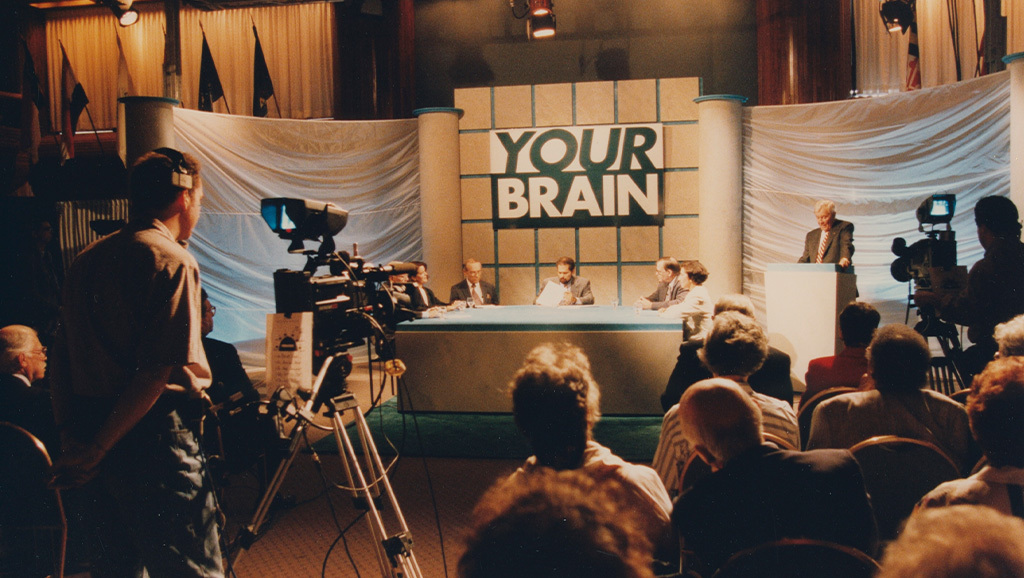
From Broadcast to Belonging: Dana's Public Engagement Evolution
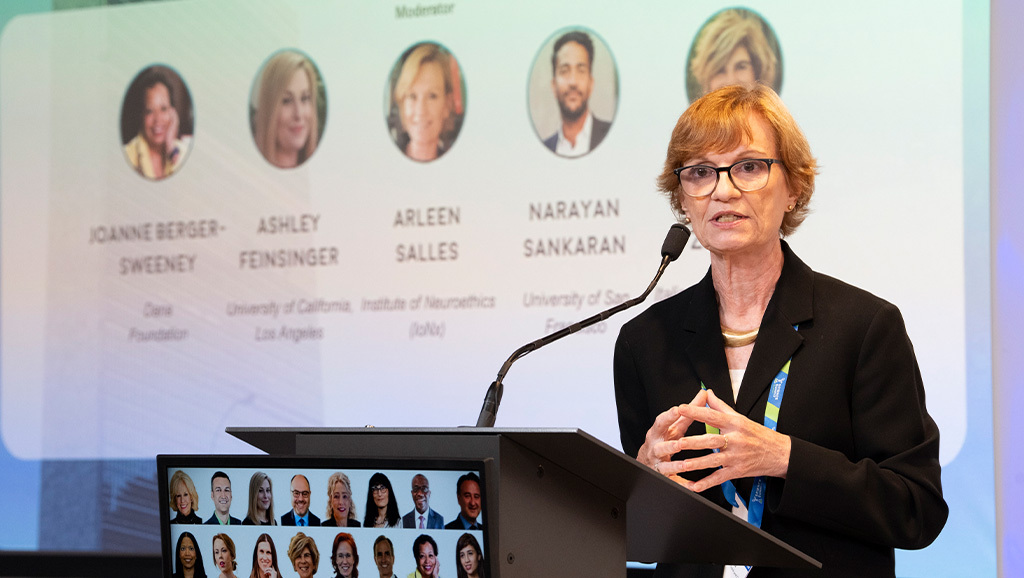
Reciprocity in Neuroscience: Dana Foundation Panel at the UN Science Summit
